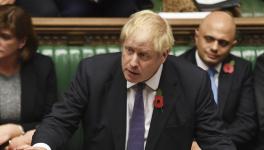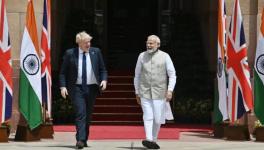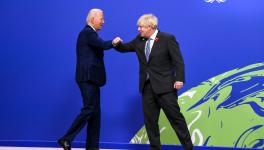UK in Tough Nationwide Lockdown to Tackle Surge in New COVID-19 Variant
Image Courtesy: DW.com
London: The United Kingdom entered a tough new stay-at-home lockdown on Tuesday after Prime Minister Boris Johnson said it has been “both frustrating and alarming” to see the speed with which the new variant of the coronavirus is spreading and declared that hospitals in the country are under more pressure from the deadly virus than at any time in the pandemic.
While Scotland’s new rules, which involve school and business closures become legal from Tuesday, England’s rules -- akin to the stringent measures of the first wave of the pandemic in March 2020 -- become law in the early hours of Wednesday. However, Johnson has urged the public to begin following the strict work from home rules right away.
The new rules are expected to stay in place until mid-February with a review planned based on vaccine rollout data and infection rates.
“Our scientists have confirmed this new variant is between 50 and 70 per cent more transmissible -- that means you are much, much more likely to catch the virus and to pass it on,” Johnson said in his televised address to the nation on Monday night.
“We must therefore go into a national lockdown which is tough enough to contain this variant. That means the government is once again instructing you to stay at home. You may only leave home for limited reasons permitted in law, such as to shop for essentials, to work if you absolutely cannot work from home, to exercise, to seek medical assistance such as getting a COVID test, or to escape domestic abuse,” he said.
The devolved regions of Wales and Northern Ireland were already under strict lockdown measures since the middle of last month.
According to the latest data, in England alone, the number of COVID-19 patients in hospitals has increased by nearly a third in the last week, to almost 27,000. That number is 40 per cent higher than the first peak of the pandemic in April. On December 29, more than 80,000 people tested positive for COVID across the UK – a new record – and the number of deaths is up by 20 per cent over the last week.
“Of course, there is one huge difference compared to last year. We are now rolling out the biggest vaccination programme in our history. So far, we in the UK have vaccinated more people than the rest of Europe combined,” noted Johnson, as he said that the rollout of the Oxford/AstraZeneca vaccine from this week means the pace of vaccination is accelerating alongside the Pfizer/BioNTech vaccine already being administered.
The closure of schools, which the UK prime minister said could act as “vectors for transmission, causing the virus to spread between households”, means remote learning at least until the end of February and students due to sit for their board level exams would be subject to different methods of assessment for the year.
“The weeks ahead will be the hardest yet but I really do believe that we are entering the last phase of the struggle. Because with every jab that goes into our arms, we are tilting the odds against COVID and in favour of the British people,” said Johnson.
The move followed the advice from the chief medical officers (CMOs) of all four devolved nations of the United Kingdom that the country's coronavirus alert level should move from Level 4 to Level 5, the very highest level of alert indicating that the National Health Service (NHS) is in danger of being overwhelmed by patients.
“Cases are rising almost everywhere, in much of the country driven by the new more transmissible variant. We are not confident that the NHS can handle a further sustained rise in cases and without further action there is a material risk of the NHS in several areas being overwhelmed over the next 21 days,” the CMOs said in a statement.
The House of Commons has been recalled from Christmas recess to allow members of Parliament to vote on England's new restrictions on Wednesday. The Opposition Labour Leader Sir Keir Starmer has said his MPs would "support the package of measures", saying "we've all got to pull together now to make this work".
Under the new lockdown, support and childcare bubbles will continue, and people can meet one person from another household for outdoor exercise, which should be limited to once per day. Communal worship and funerals can continue, subject to limits on attendance.
Weddings are allowed in "exceptional circumstances" with up to six people. And, people who are clinically extremely vulnerable will be contacted by letter and should shield once more and remain indoors.
On Monday, the UK reported a record 58,784 cases, as well as a further 407 deaths within 28 days of a positive test, taking the death toll to 75,431.
Germany Set to Extend Hard Lockdown
Berlin: Germany's disease control centre on Tuesday reported 944 more COVID-19 deaths, fuelling expectations that Chancellor Angela Merkel and the country's 16 state governors will extend the country's lockdown until the end of the month.
Germany's latest lockdown took effect December 16 after a partial shutdown starting in early November failed to reduce the number of daily new coronavirus infections. It was initially set to expire January 10.
Merkel's meeting with the governors on Tuesday will decide how long the lockdown should go on and to what extent schools will reopen. Another topic high on the agenda will be addressing criticism of the country's vaccination programme amid frustrations over its gradual start.
Vaccinations in Germany and the rest of the 27-nation European Union started over a week ago. In Germany, a nation of 83 million, nearly 265,000 vaccinations had been reported by Monday, the Robert Koch Institute said.
Opposition politicians and even some within Germany's governing coalition have criticised the EU's cautious advance ordering of the Pfizer-BioNTech vaccine — the only one so far cleared for use in EU nations. The EU's medical regulator is also evaluating a vaccine by Moderna.
The country's health minister has repeatedly said that the vaccinations are progressing as expected and that the slow start is because mobile teams are first going to nursing homes to vaccinate the most vulnerable, which takes more time than inviting people to mass vaccination centres.
Still, in a nod to the heavy pressure, Health Minister Jens Spahn said he has asked the country's agency in charge of vaccinations if the second shot of the Pfizer-BioNTech vaccine could be delayed in order to be able to vaccinate more people right away with a first shot.
Germany's new infections remain at more than twice the level of 50 per 100,000 residents over seven days, which the government wants to reach.
In part because of lower testing and delayed reporting, it's not yet clear what effect the Christmas holidays will have on Germany's new coronavirus infections, hospitalizations and deaths.
Germany has reported 35,518 virus-related deaths overall.
Get the latest reports & analysis with people's perspective on Protests, movements & deep analytical videos, discussions of the current affairs in your Telegram app. Subscribe to NewsClick's Telegram channel & get Real-Time updates on stories, as they get published on our website.























